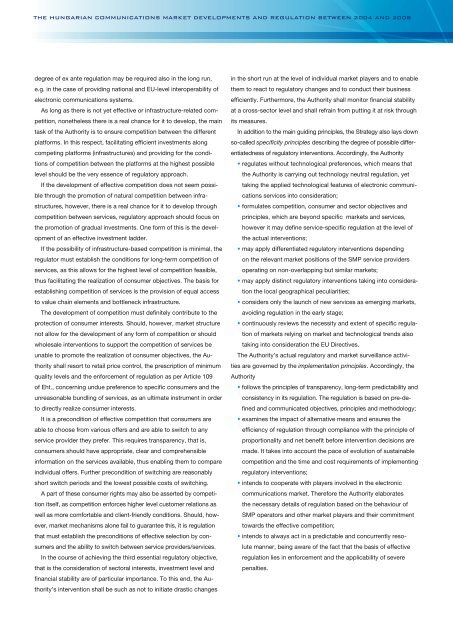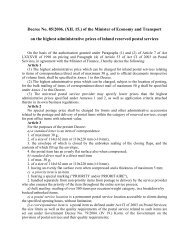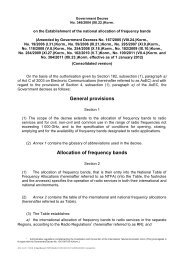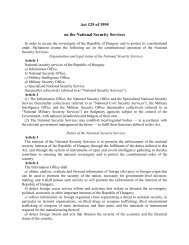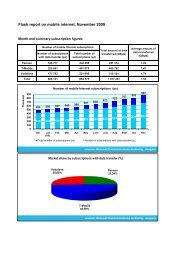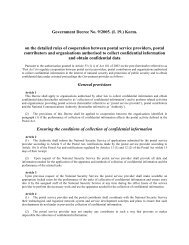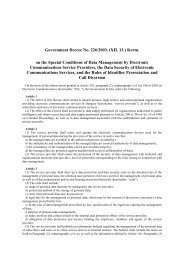The Hungarian Communications Market Developments and ...
The Hungarian Communications Market Developments and ...
The Hungarian Communications Market Developments and ...
Create successful ePaper yourself
Turn your PDF publications into a flip-book with our unique Google optimized e-Paper software.
<strong>The</strong> <strong>Hungarian</strong> <strong>Communications</strong> <strong>Market</strong> <strong>Developments</strong> <strong>and</strong> Regulation between 2004 <strong>and</strong> 2008<br />
degree of ex ante regulation may be required also in the long run,<br />
e.g. in the case of providing national <strong>and</strong> EU-level interoperability of<br />
electronic communications systems.<br />
As long as there is not yet effective or infrastructure-related competition,<br />
nonetheless there is a real chance for it to develop, the main<br />
task of the Authority is to ensure competition between the different<br />
platforms. In this respect, facilitating efficient investments along<br />
competing platforms (infrastructures) <strong>and</strong> providing for the conditions<br />
of competition between the platforms at the highest possible<br />
level should be the very essence of regulatory approach.<br />
If the development of effective competition does not seem possible<br />
through the promotion of natural competition between infrastructures,<br />
however, there is a real chance for it to develop through<br />
competition between services, regulatory approach should focus on<br />
the promotion of gradual investments. One form of this is the development<br />
of an effective investment ladder.<br />
If the possibility of infrastructure-based competition is minimal, the<br />
regulator must establish the conditions for long-term competition of<br />
services, as this allows for the highest level of competition feasible,<br />
thus facilitating the realization of consumer objectives. <strong>The</strong> basis for<br />
establishing competition of services is the provision of equal access<br />
to value chain elements <strong>and</strong> bottleneck infrastructure.<br />
<strong>The</strong> development of competition must definitely contribute to the<br />
protection of consumer interests. Should, however, market structure<br />
not allow for the development of any form of competition or should<br />
wholesale interventions to support the competition of services be<br />
unable to promote the realization of consumer objectives, the Authority<br />
shall resort to retail price control, the prescription of minimum<br />
quality levels <strong>and</strong> the enforcement of regulation as per Article 109<br />
of Eht., concerning undue preference to specific consumers <strong>and</strong> the<br />
unreasonable bundling of services, as an ultimate instrument in order<br />
to directly realize consumer interests.<br />
It is a precondition of effective competition that consumers are<br />
able to choose from various offers <strong>and</strong> are able to switch to any<br />
service provider they prefer. This requires transparency, that is,<br />
consumers should have appropriate, clear <strong>and</strong> comprehensible<br />
information on the services available, thus enabling them to compare<br />
individual offers. Further precondition of switching are reasonably<br />
short switch periods <strong>and</strong> the lowest possible costs of switching.<br />
A part of these consumer rights may also be asserted by competition<br />
itself, as competition enforces higher level customer relations as<br />
well as more comfortable <strong>and</strong> client-friendly conditions. Should, however,<br />
market mechanisms alone fail to guarantee this, it is regulation<br />
that must establish the preconditions of effective selection by consumers<br />
<strong>and</strong> the ability to switch between service providers/services.<br />
In the course of achieving the third essential regulatory objective,<br />
that is the consideration of sectoral interests, investment level <strong>and</strong><br />
financial stability are of particular importance. To this end, the Authority’s<br />
intervention shall be such as not to initiate drastic changes<br />
in the short run at the level of individual market players <strong>and</strong> to enable<br />
them to react to regulatory changes <strong>and</strong> to conduct their business<br />
efficiently. Furthermore, the Authority shall monitor financial stability<br />
at a cross-sector level <strong>and</strong> shall refrain from putting it at risk through<br />
its measures.<br />
In addition to the main guiding principles, the Strategy also lays down<br />
so-called specificity principles describing the degree of possible differentiatedness<br />
of regulatory interventions. Accordingly, the Authority<br />
• regulates without technological preferences, which means that<br />
the Authority is carrying out technology neutral regulation, yet<br />
taking the applied technological features of electronic communications<br />
services into consideration;<br />
• formulates competition, consumer <strong>and</strong> sector objectives <strong>and</strong><br />
principles, which are beyond specific markets <strong>and</strong> services,<br />
however it may define service-specific regulation at the level of<br />
the actual interventions;<br />
• may apply differentiated regulatory interventions depending<br />
on the relevant market positions of the SMP service providers<br />
operating on non-overlapping but similar markets;<br />
• may apply distinct regulatory interventions taking into consideration<br />
the local geographical peculiarities;<br />
• considers only the launch of new services as emerging markets,<br />
avoiding regulation in the early stage;<br />
• continuously reviews the necessity <strong>and</strong> extent of specific regulation<br />
of markets relying on market <strong>and</strong> technological trends also<br />
taking into consideration the EU Directives.<br />
<strong>The</strong> Authority’s actual regulatory <strong>and</strong> market surveillance activities<br />
are governed by the implementation principles. Accordingly, the<br />
Authority<br />
• follows the principles of transparency, long-term predictability <strong>and</strong><br />
consistency in its regulation. <strong>The</strong> regulation is based on pre-defined<br />
<strong>and</strong> communicated objectives, principles <strong>and</strong> methodology;<br />
• examines the impact of alternative means <strong>and</strong> ensures the<br />
efficiency of regulation through compliance with the principle of<br />
proportionality <strong>and</strong> net benefit before intervention decisions are<br />
made. It takes into account the pace of evolution of sustainable<br />
competition <strong>and</strong> the time <strong>and</strong> cost requirements of implementing<br />
regulatory interventions;<br />
• intends to cooperate with players involved in the electronic<br />
communications market. <strong>The</strong>refore the Authority elaborates<br />
the necessary details of regulation based on the behaviour of<br />
SMP operators <strong>and</strong> other market players <strong>and</strong> their commitment<br />
towards the effective competition;<br />
• intends to always act in a predictable <strong>and</strong> concurrently resolute<br />
manner, being aware of the fact that the basis of effective<br />
regulation lies in enforcement <strong>and</strong> the applicability of severe<br />
penalties.


